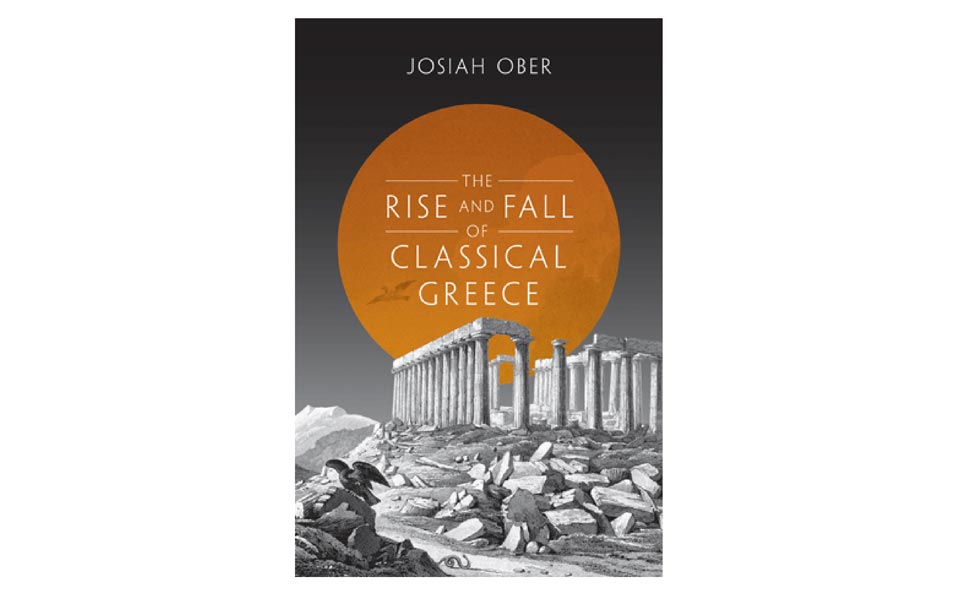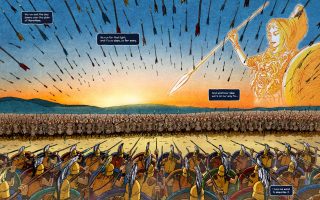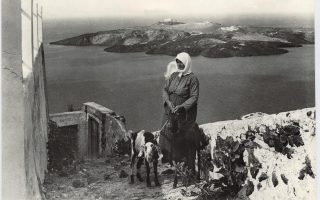Josiah Ober on the rise and fall of ancient Greece

Ideas like the rule of law, competitiveness, specialization and innovation are all linked to our modern understanding of progress. However, for Josiah Ober, professor of political science and classics at Stanford, these concepts were successfully applied in ancient Greece and they were the foundation for its economic and cultural flourishing.
In his most recent book, “The Rise and Fall of Classical Greece” (Princeton University Press 2015), Ober explains the reasons behind the rise of Greek civilization and how its influence went on after Greece was conquered by the Romans. The book draws heavily on data from Danish historian Mogens Hansen’s classic study “An Inventory of Archaic and Classical Poleis.”
Ober cites a great number of diagrams and maps to lay out demographic and economic developments in 1,035 ancient Greek city-states recorded as having taken place between the 8th and 4th century BC in mainland Greece and the islands, Asia Minor, the Black Sea, Sicily, south Italy and north Africa.
The writer claims that the cultural prevalence of classical Greece was based on high economic growth, which was in turn based on the dominance of pioneering political institutions, institutions which were centered around the citizen and were based on the rule of law. In a broader context of decentralized power and in spite of civil conflict and the imperfections of the different political systems implemented, Athens encouraged a dynamic paradigm that brought prosperity for five centuries. Geography and climate were not the fundamental factors of progress. Rather, it was the specialization in products and services, the dependence on experts, the intense competition between self-ruled poleis, institutional and technological changes that traveled beyond borders, the constant exchange of ideas and information, an outward-looking attitude, open trade that reduced the cost of transactions, the cooperation in the form of alliances and “koina” (sing. “koinon,” an early form of representative government).
Sparta specialized in martial arts, Athens excelled in naval innovation, money and finance and democratic reforms that bolstered the feeling of fairness and security while encouraging investment in public works and human capital.
Several novelties – especially in military planning, in financial management, the use of outside experts, the balancing of individual and collective interests through the distribution of the spoils of war – were later adopted by Philip II of Macedon and Alexander the Great.
According to Hansen’s inventory, the total population of poleis across Greece (the criterion being Greek culture, not Greek origin) in the late 4th century is estimated at 8 million people; the total area is put at 190,000 square kilometers, or 1.5 times the size of today’s Greece. In this urbanized and densely populated Greek world, the majority of poleis were small in size. The big poleis, such as Athens, Sparta and Syracuse, stood out as, including nearby areas, their population hovered at around 250,000 people. Those with full citizen rights in Athens (between 30,000 and 50,000 men) enjoyed equality of law, speech and taxation.
The middle class was important. The economy, which was based on commerce and naval power, achieved constant growth that reflected on state wealth and per capita income. It is estimated that 1 percent of Athenian citizens possessed 30 percent of wealth and that 10 percent of them possessed 60 percent of total wealth. At the same time, it is estimated that between 7.5 and 9 percent of the people owned 30-35 percent of the land. Income distribution data (Gini index 0.7) were similar to some developed 20th century countries.
According to Ober, these strong foundations allowed Athens a speedy recovery following its defeat in the Peloponnesian War in 404 BC. They also allowed the Hellenic world to flourish in the 80 years until Macedonian rule expanded across Greece. The fall of classical Greece was more a case of “creative destruction,” the author claims, without the signs of a total collapse.
During the Hellenistic period many Greek poleis continued to be autonomous or organized into koina, Greek culture was kept alive after being adopted by the Romans to be continued through the Byzantine and Renaissance eras which ensured its “immortality” – as testified by Lord Byron 200 years ago in “Childe Harold’s Pilgrimage.”
According to the author, classical Greece is a source of inspiration for those who put forward a citizen-centric democratic paradigm, the first of its kind which achieved an unprecedented political, economic and cultural flourishing all at the same time.
* Achilles Paparsenos served as press attache of the Greek Embassy in Washington.





